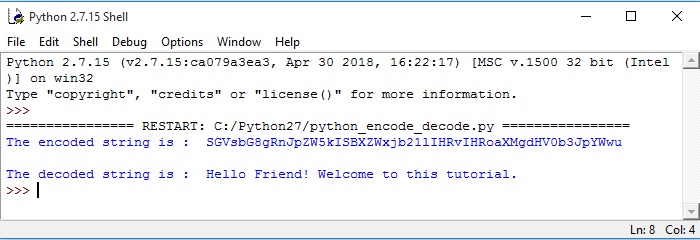

Python strings, buffer objects and memory Input must be an object which provides the bf_getreadbufīuffer slot. """ Decodes the object input and returns a tuple (output
#Base64 decode python code#
UPDATE: Actually, and this is the most important example I guess :) take a look at the source code for encodings/base64_codec.py which is that decode() uses: def base64_decode(input,errors='strict'): To answer your question, both works the same, although b64decode/encode are meant to work only with base64 encodings and str.decode can handle as many encodings as the library is aware of.įor further information take a read at both of the doc sections: decode and b64decode. In this case, you're telling it to handle a bas64 string so it will do it ok. The difference is that str.decode will take a string of bytes as arguments and will return it's Unicode representation depending on the encoding argument you pass as first parameter. decode is passed the base64 argument string. Take a look at this code: >b=base64.b64encode('hello world')īoth decode and b64decode works the same when. Notice that strict has to be a string, otherwise python interpreter would try to search for a variable named strict and if it didn't find it or otherwise has other value than: strict, ignore, and replace, it'll probably would've complain about it. This line should've work if you would've called like this: decoded_clean_pk = clean_pk.decode('base64', 'strict') The script runs after that change, and produces correct-looking output, but I've got enough instinct to know that I can't necessarily trust my instincts here. So I turn the illustrious python wonks on SO to ask if that line might be replaced by this one (with the appropriate import added): decoded_clean_pk = base64.b64decode(clean_pk)

I'm making the semi-educated guess that the line is supposed to decode the base64 data, but I learned from the Debian OpenSSL debacle some years back that blindly diddling with crypto-related code is a Bad Thing(TM). Since it doesn't seem to like (or rather, to know) whatever 'strict' is supposed to represent. Specifically, this line crashes: decoded_clean_pk = clean_pk.decode('base64', strict) The clearest thing I've found is a script on Videntity's blog, but not being versed in python, I'm hitting a stumbling block. Apparently, an X509 cert needs some massaging to be used in a CERT record, and I'm trying to work out how that's done. Whether or not we internally use DNS rather than LDAP for sharing certificates, I'm obviously going to need to set up the former to test against, and that's what's got me stuck. The Code Furies have turned their baleful glares upon me, and it's fallen to me to implement "Secure Transport" as defined by The Direct Project.


 0 kommentar(er)
0 kommentar(er)
